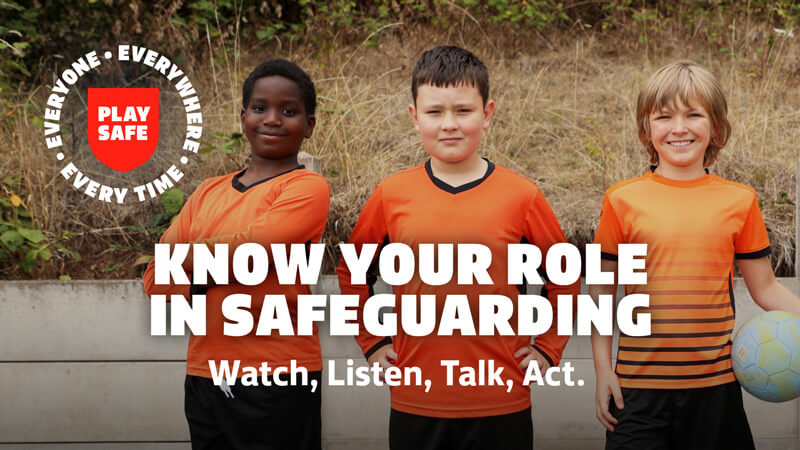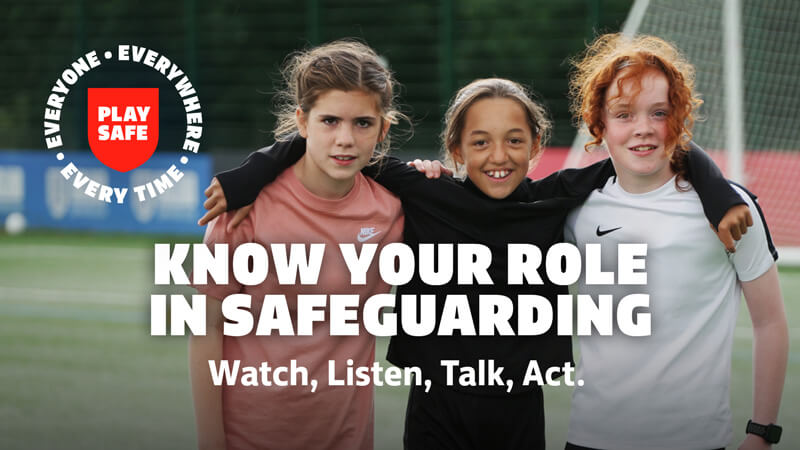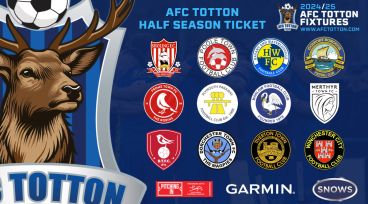
KNOW YOUR ROLE IN SAFEGUARDING
EVERYONE, EVERYWHERE, EVERY TIME.
The Play Safe Weekend - 28/29 September 2024
The Play Safe Weekend comes around every year to celebrate our collective effort, support, and care. For Play Safe 2024, we’re asking everyone to know their role in safeguarding. This means no matter what role you have in football, you know your role and responsibility in making it a safe space for all.
What is Play Safe?
Every season, English football comes together to promote Play Safe. It’s a year-round campaign that amplifies the importance of safeguarding across all levels of the game. Making sure football is safe, fun, and enjoyable for everyone, everywhere, every time.
Why is Play Safe important?
Anyone’s love of football can be taken away by negative behaviour and abuse. Safeguarding prevents this from happening. A Play Safe weekend at the start of each season is there to put safeguarding at the forefront of people’s minds. It reminds everyone to watch, listen, talk, act in every football environment.
FIND YOUR ROLE HERE
Parent/Carer
Parents and carers remain responsible for checking their child is taken care of in football.
Things to do as a parent/carer:
- Complete the free, 30-minute online ‘Safeguarding Awareness for Parents/Carers’ course
- Know who your child’s coach/manager is and how to contact them.
- Know how to contact your club’s welfare officer and where to report a concern.
- Ask about FA DBS Checks and safeguarding qualifications of the staff at your club.
- Know what unacceptable behaviour looks like and the club’s Codes of Conduct.
- Keep on checking in with your child(ren) – make sure they know how to report a concern.
Committee Member
Committee Members have an explicit responsibility to ensure safeguards are consistently in place across the clubs’ activities. Working together you can really make a difference to keep everyone safe.
Things to do as a committee member:
- Make sure your club is following a safer recruiting process - you can find that information here
- Support coaches, check they’re working with the right ratios and role modelling the clubs code of conduct, make sure you’re happy with the way they communicate and engage with players.
- Make sure all your club’s digital/social media communications follow safe practice; they should be for specific football purposes.
Coach/Manager
As a coach or manager, you’re in a position of trust and responsibility to many.
Things to do as a coach or manager:
- Check and challenge your own behaviour, as well as other peoples. Shouting at children is not okay.
- Make sure you’re working with another DBS-checked coach.
- Only communicate online with a child’s parent or carer. Keep it football related.
- Be fair, encouraging, inclusive. Try to understand every child’s needs, speak with their parent/carer about what would work best for their child.

Player (under-18)
On or off the pitch, players should expect to feel safe, always.
Things to do as a player:
- If something feels wrong or unsafe, know how and where to report a concern.
- Keep talking to your parent/carer. Tell them if you’re worried about anything.
- Expect to play in a safe environment, always.
- Be positive and always support other players.
Referee/Match Official
Being at the heart of the game, its important referees/match officials look after themselves and others.
Things to do as an under-18 referee/match official whether on matchday or at training events:
- Know who you’re officiating/training with, how you’re getting to the venue and who the club/event organiser point of contact is.
- For matches, check important details, like changing facilities and post-match support.
- Be prepared for a challenging game. Know how and where to report a problem.
Things to do as an adult referee/match official:
- Know who you’re officiating/training with and who the main point of contact is.
- Be responsible before offering under-18 officials a lift; get parent/carer consent, consider will there be a third person in the vehicle, ensure they sit in the rear of the vehicle.
- Check important details before a match, like changing facilities or post-match support.
- Be prepared for a challenging game and know how to manage conflict. Know how and where to report a concern.
SWO/CWO
As a designated Safeguarding Officer (DSO) or Club Welfare Officer (CWO), you’re the first port of call.
Things to do as a DSO/CWO:
- Know who your members are and how to reach them. Consider how you can ensure everyone knows who you are and how to contact you.
- Share news and information about Play Safe to everyone at your club.
- Keep safeguarding as a regular item at committee meetings.
- Think about what could make a positive difference at your club/league and who could help you bring about that change.
Spectators
Supporters should keep the sidelines positive and supportive. This way, the game is better for all.
Things to do as a spectator:
- Never shout abusive or negative things during a match. Keep it positive. Clap for everyone.
- If there’s something that feels off or unsafe, report it to the club welfare officer, or member of staff.
When everyone knows their role, together we create an ever-safer game.
 AFC Totton
AFC Totton











































